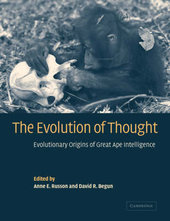
|
The Evolution of Thought: Evolutionary Origins of Great Ape Intelligence
Paperback / softback
Main Details
| Title |
The Evolution of Thought: Evolutionary Origins of Great Ape Intelligence
|
| Authors and Contributors |
Edited by Anne E. Russon
|
|
Edited by David R. Begun
|
| Physical Properties |
| Format:Paperback / softback | | Pages:396 | | Dimensions(mm): Height 226,Width 187 |
|
| Category/Genre | Animal behaviour
Primates |
|---|
| ISBN/Barcode |
9780521039925
|
| Classifications | Dewey:599.881513 599.881513 |
|---|
| Audience | | Professional & Vocational | |
|---|
| Illustrations |
48 Tables, unspecified; 6 Halftones, unspecified; 30 Line drawings, unspecified
|
|
Publishing Details |
| Publisher |
Cambridge University Press
|
| Imprint |
Cambridge University Press
|
| Publication Date |
23 July 2007 |
| Publication Country |
United Kingdom
|
Description
Research on the evolution of higher intelligence rarely combines data from fields as diverse as paleontology and psychology. In this volume we seek to do just that, synthesizing the approaches of hominoid cognition, psychology, language studies, ecology, evolution, paleoecology and systematics toward an understanding of great ape intelligence. Leading scholars from all these fields have been asked to evaluate the manner in which each of their topics of research inform our understanding of the evolution of intelligence in great apes and humans. The ideas thus assembled represent a comprehensive survey of the various causes and consequences of cognitive evolution in great apes. The Evolution of Thought will therefore be an essential reference for graduate students and researchers in evolutionary psychology, paleoanthropology and primatology.
Author Biography
Anne E. Russon is a Professor of Psychology at Glendon College of York University in Toronto, Canada. David Begun is a Professor of Anthropology at the University of Toronto.
Reviews'... a good overview of the present state of research.' Gorilla Journal 'The book's strengths are several. The editors had a clear idea of what they wanted from their interdisciplinary encounter and they framed the process with welcoming introductory chapters and a masterly concluding one. Ethologists will find accessible even the most esoteric data ... most chapters make a real effort to be understood by non-specialists ... this is a brave and provocative book. It is a call to arms for true-disciplinary collaboration. Few ethologists know palaeontology, but all will learn from this bridge-building effort.' Ethology 'it may be impossible to travel back in time in order to reconstruct exactly the sequence of events that shaped the cognitive architecture of our nearest living and extinct relatives, but books like this one do a good job of allowing us to imagine the most likely scenarios, and of exposing gaps in knowledge that have to be filled for the complete picture to emerge.' Primates
|